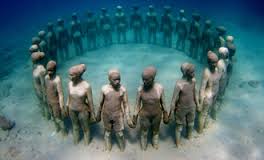Joe Drexler-Dreis
Last month, the Centre for Liberation Theologies and Anthropos Research Group co-hosted a colloquium, “Beyond the Doctrine of Man: Perspectives on Enfleshment.” During the colloquium, we aimed to develop responses to a fundamental question from a number of angles. Much of the motivation for this question came from the under-appreciated Jamaican decolonial intellectual, Sylvia Wynter.
Sylvia Wynter’s project is strongly shaped by an analysis of western modernity that begins with the experience of western modernity as coloniality. She responds to western modernity from the particular locus of the Caribbean (and specifically Jamaica). By turning to an analysis of the historical matrix of western modernity, Wynter describes herself as moving “beyond resentment, beyond a feeling of anger at the thought of how much the population to which you belong has been made to pay for their rise to world dominance,” and instead asking, “How did they do it?”[1] This is a key move that Frantz Fanon, an intellectual who largely shapes decolonial thought, also makes. Early in his first work—on the first pages of his first book—Fanon describes his own move from a cry or shout that emerges from anger (le crí) to discourse. In centralizing an analysis of western modernity/coloniality, Wynter introduces significant conceptual categories that can make sense of western modernity from loci in which it is experienced as coloniality.
A crucial category that Wynter brings to the analysis of colonial modernity emerges out of her concern about how the human person has been described within the perspective of western modernity and how this description creates experiences of western modernity as coloniality. Wynter refers to the overrepresentation of white, bourgeois, heterosexual males as the human that is indigenous to western modernity as “Man.” In a number of her critical articles, Wynter presents a historical argument regarding the development of Man. She describes a move from the theocentric Christian descriptive statement of the human as Man to an invention of Man as political subject (a shift occurring between the 15th and 18th centuries), and then to an invention of Man based on biological sciences and racializing discourses (beginning in the 18th century). Part of the tactics of the affirmation of Man is the “blocking out” of any “counter-voice,” and, in the contemporary context, particularly of “of a Black counter-voice.” Because the persistence of Man is “the foundational basis of modernity,” and a general problem that creates subsets of problems,[2] Wynter describes the central struggle of the contemporary context as between securing the well-being of Man or the Human. This struggle requires “unsettling” Man by re-describing the human outside of Man.
The analytic dimension of Wynter’s project leads to a constructive question, already suggested by Wynter herself, of how to re-describe the human person beyond the confines of Man, or beyond the Doctrine of Man. Wynter frames it as such: “if they did it, how can we, the non-West, the always native Other to the true human of their Man, set out to transform, in our turn, a world in which we must all remain always somewhat Other to the ‘true’ human in their terms?”[3] The goal of our colloquium was to wrestle with this question and provide constructive responses. To do this, we brought a variety of issues to the table. How do those subjects outside the domain of Man imagine and live in ways that offer different conceptions of the human? How might this challenge Man? How can academic disciplines emerging in the 1960s out of political movements—e.g., Black studies, Latina/o studies, Native studies, Women and Gender studies, Queer theory—bring out ways new modes of humanity of been imagined? What political stances emerge in sites where bodies are reduced to flesh—that is, where human persons are stripped of the protections that the recognition of embodiment offers? Might these sites where bodies are rendered flesh paradoxically allow for a movement beyond the Word/World of Man? Speakers, respondents, and participants in the colloquium developed genuinely transdisciplinary responses to these questions—that is, the problems themselves guided the discussion and ideas, rather than attempts to hold to certain principles sacred to particular disciplines.
During the colloquium, I considered the possibilities of a religious framework to respond to the types of questions Wynter’s work poses, and did so by considering how religion functioned for Nat Turner. Nat Turner led one of the most significant slave rebellions in U.S. history in 1831 in Southampton, Virginia. After he was captured, he dictated “confessions” to a local attorney, Thomas R. Gray, in which he articulated the reasons for the rebellion. In the “Confessions,” Turner described the fundamental motivation for the rebellion within a religious commitment. Despite the historical significance of the rebellion, the scholarly engagement with the religious vision Turner presents has been limited—and by and large restricted to interpretations that remain within the scope of Black Theology. Taking Nat Turner’s “Confessions,” scholarship on slave religion, and recent discussions on the flesh as its basis, I developed a way of understanding the religious vision that informed and became manifest in Nat Turner’s 1831 slave rebellion as providing a ground and epistemology from which to contest the networks of relation forced upon him. Ultimately, Turner’s self-understanding and understanding of reality suggest an alternative understanding of the human. I argued that, with reference to the religious, Nat Turner actualizes a project of contesting Man and that his religious vision remains relevant to the contemporary praxis of contesting Man.
[1] David Scott, “The Re-Enchantment of Humanism: An Interview with Sylvia Wynter,” Small Axe 8 (September 2000): 175.
[2] Sylvia Wynter, “Unsettling the Coloniality of Being/Power/Truth/Freedom: Towards the Human, After Man, Its Overrepresentation—An Argument,” CR: The New Centennial Review 3, no. 3 (Fall 2003): 288.
[3] Scott, “The Re-Enchantment of Humanism,” 175.

